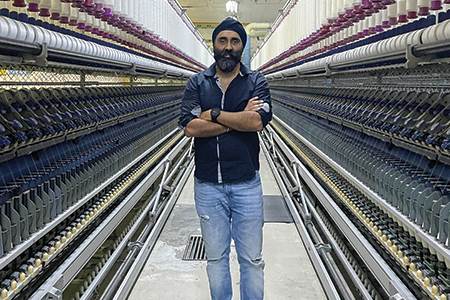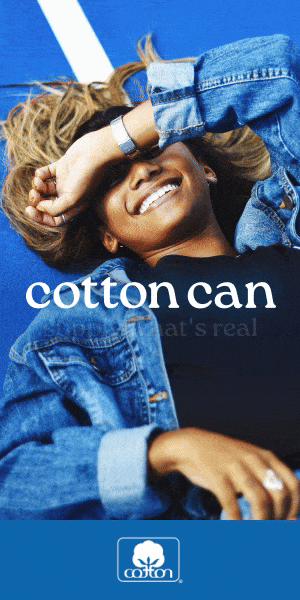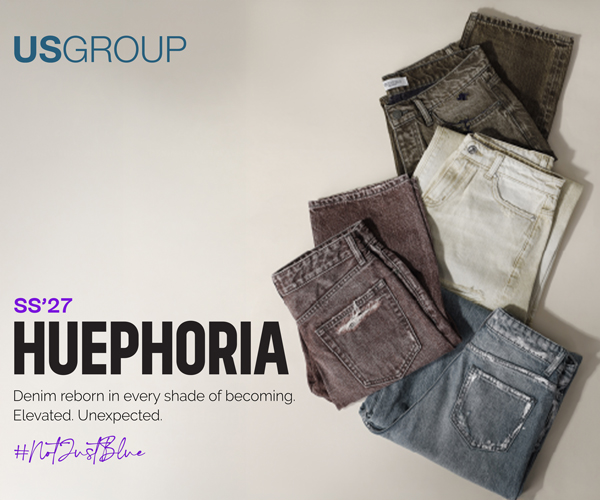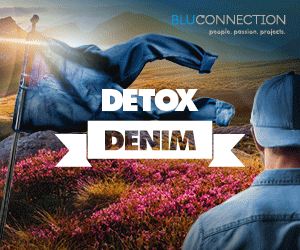Amrin Sachathep: Covid has shown that trust is vital

From a ‘strategically good’ location close to Bangkok in Thailand, Atlantic Mills specialises in selvedge and Japanese-style denims but with a European slant on colour, creating high-quality, long-lasting fabrics that look even better over time. Its managing director, Amrin Sachathep, shares the vision of his family’s mill.
Q Can you tell us a bit about Atlantic’s offering. What advantages or challenges does your location in Thailand offer?
A I think the history helps tell the story. My grandparents came from India in the 1930s and started trading in textiles, buying from the north east of Thailand and reselling in Bangkok. In 1960, my uncle moved to Japan and shipped denim fabrics from the very best Japanese mills back to Thailand. The business grew significantly, but there was a diminishing product availability from Japan over time, so we started to develop our own product. Twenty years ago, we took over the last denim mill in Ireland, and moved hundreds of containers back to Thailand. The origin of Atlantic Mills is derived from the actual starting origin which was on the coast of the Atlantic Ocean.
We gradually bought new machines and grew organically. Fifteen years ago, we designed a rope dye machine from Japan; we’re probably one of the only companies outside Japan to own one, simply because of my family’s history. My family spent more than three decades in Japan and we continue to have an office there. We redesigned the machine so it has the ability to innovate and feature European-inspired colours while maintaining the consistency of the Japanese rope dyeing techniques. We also brought Japanese technicians from Okayama and they have been working for us ever since.
In 2014, we took over our spinning supplier. The textile business was collapsing very quickly in Thailand simply because it was not competitive compared to the full-package systems being offered in Bangladesh, Pakistan and India, which had GSP privilege [Generalised Scheme of Preferences, which removes import duties into the European Union]. Thailand had moved away from GSP so we set up a garment factory in Laos as it has free duty access into Europe. We created that factory with green credentials, and now we can offer the full package. Customers also wanted to have different options to China. Thailand is strategically a very good location. Unfortunately, we don’t have our own raw material but that's one thing we continue to pursue with partners globally.
What are your specialities?
Atlantic has been in the premium game from the beginning. People used to tell us we were expensive but we were not expensive – we were offering a product that was made without sacrifices just as a Michelin chef would do with the food he cooks. We always created a product which is very dense and could withstand durability, essentially the reasons denim was created in the first place. Our denim is real denim: dark indigo colours and very good penetration so you can wear it raw.
We are one of the biggest selvedge producers out there, selvedge is our niche, it defines the mill. We’ve always focused on cotton and great recyclability – we don't really use much polyester, we try to steer away from it, although we do add it for some customers. It’s generally a price game and it reduces the impact of the product look; real denim has to be made from cotton and we continue to focus on it. We really want to keep the denim enthusiasm.
For many industry friends, the pair they wear every day is ours; they want to see how it looks over time. The most sustainable product in that sense is the product that’s long-lasting and you don’t have to wash it, you're saving water and you know the mill is taking care of the fabric.
You have a big focus on the environment, especially in terms of recycling. Why is this important and how easy is it to access post-consumer waste in Thailand?
Thailand is one of the biggest collection points for second-hand clothing, so we buy post-consumer waste from the market and cut the jeans ourselves. But it’s a very tedious task, it isn’t that easy to work with and make economical. Therefore, we do more post-industrial waste. Depending on what product category you're using, you might have 100% virgin cotton and then use the waste from the virgin and spinning for open-end spinning; it’s high-twisted cotton. But by doing recycled, you're reducing certain elements of the fabric, so you have to be careful.
Recycling has always been very important from the beginning. We want to close the loop so if you blend fibres you’re creating a bigger disaster for the environment. It’s funny, people talk about recyclability on different levels, but we had to do it to survive. We recycle about 70% of water as water costs money. Sustainability is also a cost-saving exercise – your investment today might give you a return only 10 years later, but it’s a driving force to stay in business. We use palm shells from Thailand for our boiler and solar electricity, so we also use as much renewable as we can.
In terms of the technical side of fabrics and dyes, what elements do you enjoy focusing on the most?
We have two dyeing sides. One is the Japanese deep, dark indigos that are meant to be worn raw. This takes a lot of effort to take the colour down, it takes a lot of time to get that product to look washed out, as we want to create that authentic look. It’s durable and long-lasting.
On the other side, we create low-penetration indigo, that means you can wash the colour down quicker, it’s extremely laser friendly, you don't have to use potassium permanganate and you're also creating a product which can also be a water-saving exercise for the garment factories. We like to highlight these two sides as most other mills are in the middle.
We do have other products. We have a rope-dye twelve-dip, a six dip and a two-dip indigo created with indigo from a small farm in Japan. The last thing we want to do is create something super dark then have to wash it down a lot and waste more water, so it’s a very flexible way of working.
On the fibres side, we work with sustainable fibres like traceable cotton, Tencel and CiCLO [a synthetic stretch fibre that biodegrades]. We’ve also created a product to replace spandex that’s biodegradable, which we will launch with a partner in US and a couple of brands. The idea is moving fibres towards biodegradability and recyclability.
On the technology side, we’re working on the back-end to create a blockchain technology to tell the user where everything comes from. A lot is still manual, so it’s not properly traceable. We’re pushing each of our suppliers to get there and when it's ready, we will put it all together. It’s hard to get down to the individual cotton farms as cotton gets blended from different fields to even out the colour. Brazil's doing a phenomenal job where they’re trying to label every bale with the actual farmer.
Many of your customers are based in Europe and the US. How have you had to adapt around lockdowns and the supply chain disruptions we’ve seen over the past two years?
We've been very lucky to have customers who haven’t really reduced their order size through covid so we've been able to be able to maintain the factory at a good level. Thailand never went into lockdown on a manufacturing level. Customers noticed that, especially when they saw Vietnam close for three to four months recently and Cambodia and China close for a couple of months. They saw Thailand was the place to be. People have asked us to make us their main partner in the region again. Covid has taught us that trustability is the one thing that you cannot do through an office. Trustworthiness in business has become even more important when you cannot travel to see the products. So, covid has actually helped us significantly, as it has with a lot of the Thai factories, even though we haven’t had any help from the government.
Over the last eight or nine years, we wanted to move away from being dependent on the US and Europe so we set up offices in smaller countries like South Korea, Peru, Philippines, Indonesia, Vietnam, India and Turkey. Our vision was to create products to sell to these countries’ domestic business and it’s been a big success. US and Europe represents 60% of our business, all these other countries make up the other 40%. Indonesians love the 20oz selvedges and it’s a very hot country!
How have you found the reduced travelling?
Nobody is inviting you to see them at their office, but it’s actually very important to travel at this point as if you’re meeting outside the office you’re creating a friendship, and that’s how we’ve always done our business. Our customers are our friends. I have travelled to a couple places already because as of October, it is only one day quarantine in Thailand on return.
Looking at the industry a bit more widely, what will you be focusing on over the next few years?
It sounds bad but 20 years ago, there were all these calibres of product created from rich ideas. The market has changed, people are focusing so much on the storytelling that they’re forgetting to make the product look good. So, we want to blend the two together.
It’s always been very important for us that we don't sacrifice a product but we also keep it as sustainable as possible. We want to create something durable that you want to wear every day. A product that looks even better as you wear it down. We want to be one step ahead, we don’t want to focus on only volume businesses, we want to be niche but to create something forward-thinking and at the same time adaptable and visionary. Denim needs to evolve.
Credit photo: Atlantic Mills












